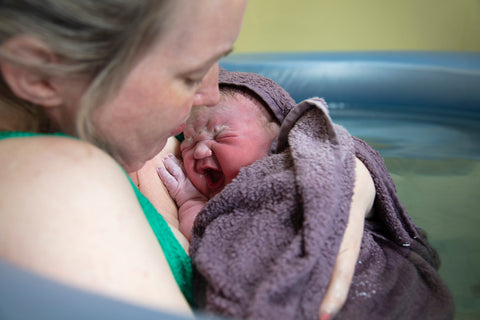Our friends at Nurtured Birth bring us this insightful blog about the benefits of Doula's and how they can support your pregnancy, birth and postpartum journey 💗
Doula and postpartum doula support has come a long way from being something only ‘crunchy mamas’ used.
Many women are starting to become aware the hospital maternity system doesn’t view them as unique and special – just another one of thousands of women giving birth. After their baby has arrived, many mothers are unprepared for the shock of parenting in today’s culture.

What is a doula?
Doulas are women who offer emotional and physical support to pregnant and birthing women. The word doula is said to come from ancient Greek, meaning “a woman who serves.”
Around the world in different cultures, doulas may be mothers, sisters or neighbours and friends.
Professional doulas are trained to provide non medical support throughout pregnancy, birth and in the postpartum period.
Doulas may decide to work only within the pregnancy/birth sphere, or they may purely care for women in the time after birth. Many doulas support all aspects of the parenthood journey, and this encompasses partners and family.
What does a doula actually do?
The main role of a doula is to provide knowledge, emotional and physical support without judgement.

Pregnancy support
A doula will meet with expectant parents a number of times during pregnancy. These meetings help parents prepare for birth and make informed decisions. They will discuss fears about birth, birth preferences and practical techniques for labor comfort. During these meetings, doulas build a relationship of trust and support before birth.
Labour and birth support
When labor begins, a doula may come to her at home or meet the expecting parents at their birth place. Doulas are like guides, accompanying the birthing woman and her partner, holding them up physically at times, suggesting different techniques or tips to make the journey smoother.
Doulas don’t act on behalf of their birthing clients, but can help communicate birth preferences to medical staff and translate suggested medical interventions so parents can make informed choices.
Emotional support
Their continuous presence during labour, encouraging and reassuring, is often the most important part of a doula’s role. Women who feel safe and supported will have a more positive birth experience, even if their birth plans needed to change.
Postnatal support
During the postpartum period, a doula can provide new parents a soft landing space as they
navigate this new transition. This allows new families to bond and have a supportive space to thrive.
Postnatal doulas provide emotional support and listen as new parents process the birth experience and reassurance about looking after their newborn, particularly if there are concerns about breastfeeding and sleeping.
They can provide practical support such as caring for baby while mama sleeps, cleaning or cooking.

What is the difference between a midwife and a doula?
It’s quite common for women to wonder if there’s a difference between doulas and midwives. After all, they both support women during pregnancy and birth.
Midwives and doulas work in the same arena but their roles are quite different.
A midwife is a health professional who cares for women during pregnancy, birth, and the postnatal period. Most midwives work within the hospital system which doesn’t allow for the continuity of care and emotional support that is essential to the birthing experience.
Doulas on the other hand aren’t medical professionals and don’t provide medical advice or procedures. They are employed to focus solely on offering the sort of support midwives traditionally performed.
Do you need a doula?
It’s been said that the benefits of doulas are so positive that every birthing family should have one.
Research has shown women who have continuous support from the same person throughout labour will be less likely to request pain relief, have an instrumental or c-section birth, and have better birth outcomes.
There’s plenty of evidence showing doula care supports women to have more positive birth experiences, and ensures partners have valuable support too.
Doulas are also invaluable for parents having a high risk pregnancy. While doulas can’t replace the specialised medical care needed in this situation, they can offer much needed emotional support and help expectant parents navigate how to have a positive birth regardless of the need for medical intervention.
What does it mean to be a doula?
Those who choose the path of a doula as a profession often have a specific reason for doing so. We asked these doulas what does it mean to be a doula for them:
Sam:
Being a doula means having the privilege of being invited into a birth space and witnessing the incredible primal power of a birthing woman, holding space while she travels elsewhere to bring her baby into the world. My own experience of birth was so beautiful and positive, it inspired me to support other women to seek the same quality of care.
Jennifer, Doulas of Melbourne’s East:
I don’t consider my work work. They say that if you love your job you’ll never work another day, and I don’t, although often exhausting and challenging, it’s still a labour of love. Being a Doula, being part of a family’s most intimate and transforming experience is such an honour. Being able to guide them to dig within themselves, to uncover the power that lies (often hidden) within, is my calling. Supporting as new parents traverse the path of creation, amazing. Being a Doula is the best job in the world.
Claire, A Special Delivery:
My choice to be a Doula comes from a deep desire to support women through the life changing experience of childbirth. Women thrive when they are well supported, confident in their choices and ability to birth and nurture their babies. It thrills me to see their confidence growing with small wins and achievements, in finding their innate strength as they navigate life and raising their children.
If you want a supportive and nurturing birth and postnatal experience please contact Nurtured Birth to discuss how they can support you.
For more great articles and inspiration, check out our blog page at bodyice.com






1 comment
Anna Collins
I found it interesting when you mentioned that professional doulas have received the proper training to perform non-medical support to pregnant and birthing women throughout their pregnancy, birth, and the postpartum period. My sister is 3 months pregnant, and since she plans to raise the child on her own, she’ll be needing all the help she can get. I’ll have to find doula support services to take care of my sister whenever I’m not around due to work and other appointments. https://fullcircledoulas.com
Leave a comment
All comments are moderated before being published.
This site is protected by hCaptcha and the hCaptcha Privacy Policy and Terms of Service apply.